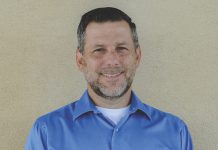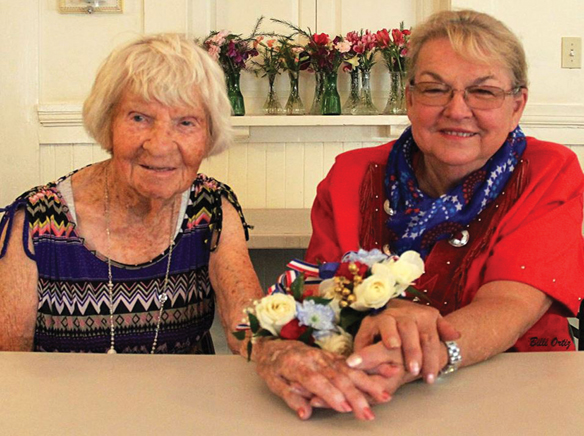There are approximately 18.5 million military veterans in the nation, including 6.7 million who served in Vietnam. Roughly 1.6 million call California home, the most of any state in the union.
According to figures from the Thomas Jefferson School of Law, San Diego County is home to about 240,000, the third highest veteran population of any county in the country.
There are approximately 18.5 million military veterans in the nation, including 6.7 million who served in Vietnam. Roughly 1.6 million call California home, the most of any state in the union.
According to figures from the Thomas Jefferson School of Law, San Diego County is home to about 240,000, the third highest veteran population of any county in the country.
These local veterans comprise approximately 13 percent of the total county population. With Veterans Day coming up on 11 November, this is the story of one local veteran who served in the U. S. Army in Vietnam, where he was wounded.
A strange start
Seeing Larry Wyatt, originally from Arkansas, on the street, you would not immediately recognize him as one of our 6.7 million Vietnam veterans. And at that, he is not an average veteran. Wyatt is the Commander of Veterans of Foreign Wars (VFW) SABLE Post 2275 in El Cajon. He joined the VFW on March 11, 1972, shortly after separating from the U. S. Army.
He was at his mother’s place in Arkansas to celebrate her birthday and decided he wanted a drink. The only place he could get a drink was in a private club, since it was a dry county. So, he went to the local VFW and joined. From that point until now, he has served as post commander, and even district commander, several times in different locales across the country.
In the Army
Wyatt grew up on a dairy farm in a small Arkansas town and was one of the 648,500 draftees who served in the Vietnam War, roughly 25 percent of the total forces, and went into the U. S. Army on November 22, 1965, undergoing basic training at Fort Polk, Louisiana.
At the time he was inducted into the Army, family and friends thought that everyone going into the Army went to Vietnam and everyone going to Vietnam was going to die, so they really did not want to see him go.
During basic training, he sought assignment to the infantry and deployment to Vietnam, which required him to complete jungle survival training, a two-week course at Fort Polk. Describing being given water and rations for two days, he learned how to purify his own water and to survive.
After completing the jungle survival course, one of only 50 out of the 200 who started to do so, he was then sent to Fort Gordon, Georgia to attend signals (communications) school.
Still without orders to Vietnam, Wyatt was then sent to Fort Benning, Georgia for jump (parachute) training.
As he tells it, “After three days, I decided I didn’t want to jump out of airplanes.”
After another course on repairing communications equipment, he finally received overseas orders – to the Republic of Korea (ROK), not Vietnam.
After about nine months in a HAWK (Homing All the Way Killer) antiaircraft missile unit in the ROK, Wyatt was promoted to Buck Sergeant (E-5) and re-enlisted specifically to go to Vietnam. He was told he would need to extend his tour of duty in the ROK for three months, for a total of sixteen months. After completing those sixteen months, he received orders, this time to the Noncommissioned Officers (NCO) Academy at Fort Riley Kansas. After finishing that twelve-week course, Wyatt finally received his orders to Vietnam.
“In country”
In country – the term used by Vietnam veterans to describe being in Vietnam – he was a section chief, leading and responsible for his crew of soldiers assigned to Company B, 5th Special Forces Group, one of the most highly decorated active duty U. S. Army Special Forces Groups.
“We were three-quarters of a mile off the Cambodian border, down in the delta along the Mekong River,” said Wyatt.
Then Sergeant Wyatt spent twenty-one consecutive months in Vietnam, including extending twice.
Twenty-one months in country, with six months remaining on his enlistment, “I got malaria. Already had some shrapnel wounds, but that was nothing,” Wyatt said (he is one of 303,704 of those Wounded in Action [WIA] during Vietnam).
He was shipped back to the hospital at Fort Riley Kansas for a month, at which time they were going to discharge him.
He told the medical personnel he did not feel really well, which they attributed to the aftereffects of the malaria. That night he went into a diabetic coma.
Subsequently, over the next two months he was sent to two different hospitals, including Fitzsimmons Army Medical Center.
He was ultimately discharged from active duty, after five years, having been declared physically unfit for military service, ironic after sixteen months in the ROK and twenty-one months, including being wounded, in Vietnam.
Like most of his fellow veterans, he returned to the civilian world and continued with his life. Wyatt ultimately worked another twenty-eight years before retiring.
Civilian life
He first worked a few years as a diesel mechanic, then as a repair technician working for his sister and brother-in-law, who owned a Zenith-Frigidaire franchise in Arkansas.
After five years of repairing televisions and appliances, Wyatt returned to working as a mechanic, moving from Arkansas to Iowa, where he worked for dealerships.
Then he opened and ran his own business for a few years. It was during this time that his son died in an accident the night before graduation, which took its toll on the family, including leading to divorce. Subsequently, Wyatt met another lady from this area and he relocated out here.
When asked if something in all the training really stands out, all these years later, Wyatt referred to the aforementioned jungle survival course.
“You really have to want to survive,” said Wyatt. “I ate a lot of roots. I ate a lot of bugs. I ate a lot of stuff I’d never eat again.”
He also recalled his fellow soldiers at the NCO Academy he attended, saying, “because when they went into the military, most of them couldn’t tie their shoes and they were scared.”
Some of the soldiers were sent to the NCO Academy before being sent to Vietnam, and they were more scared of going to Vietnam than they were on focusing on completing the instruction. Consequently, a lot of them did not make it through the Academy.
Part of the situation was attributable to the media portrayal conveying that everyone going to Vietnam was going to die. As Wyatt said, “The TV showed a lot of the wrong things, they didn’t show what was actually going on. They showed what they wanted to show.”
A telling statement, even decades later, from this combat veteran.
A veteran’s testimony
For Wyatt, being a veteran means showing you have served in the military, learned discipline, learned how to lead an adult life outside of the military, and to support the government of the United States, whether you like what the government is doing or not. In response to being asked how our nation views it veterans, Wyatt said, “Not the way they should. It depends on what part of the country you’re in and in a veteran community, they view the veterans very well. In one that is not veteran oriented, they care less if you are a veteran or not. Here in El Cajon, we are fairly lucky, the veterans are pretty well thought of.”
He continued to observe that the country is not helping its veterans as much as they should; that there are lots of veterans living on the street who need help. From Wyatt’s perspective, these veterans could get more help, if they tried to get into the Veterans Administration (VA) and the VA system. Unfortunately, many of them do not seem to want that that help; they would rather live on the street. They get a little bit of money the first of the month and spend it on things they do not need to be doing. In Wyatt’s view, the country can do more, specifically in the area of training for veterans, once they get out of the military, particularly those who retire from the military, because they know nothing else. The civilian world is vastly different than life in uniform, so more training is needed to prepare these new veterans to cope with and succeed in the civilian world. While the current transition assistance programs and training undertaken when still on active duty are good in some areas, he does not believe they go far enough in other areas.
Simply stated, adjusting is hard and veterans need more assistance.
With the VFW
Wyatt explained that after he joined the VFW back in Arkansas, he decided he wanted to help his fellow veterans. Subsequent to relocating to Iowa, he became one of three county commissioners of veteran affairs, to help fellow veterans do the paperwork necessary to apply for disability benefits and get into the VA system. That same motivation to help fellow veterans led to his multiple stints as VFW post commander and district commander.
For Wyatt, “the VFW is like a family, because everyone has done mostly the same thing. It’s a big family and sometimes it’s happy and sometimes it’s not.”
For both older veterans and specifically the younger generation of Iraq and Afghanistan vets, he advises them to join a veteran organization for some of the advice they can receive from the available breadth of the members’ collective experience.
There are shared, similar experiences. And, as part of a veterans organization, you can go into veterans hospitals and help as a representative of the organization visiting with some of the folks that are quite ill.
While talking about new members, he spoke of vets who have been out years or decades, in their 40s and 50s, maybe just retiring being the most common. Perhaps they are seeking something they cannot find anywhere else; that understanding born of shared, similar experiences.
Bottom line, organizations like the VFW, American Legion, Iraq and Afghanistan Veterans of America can help, if the veteran wants the help and is willing to simply reach out and ask for it.
Veterans Day
As Veterans Day approaches, Wyatt, like most veterans, believes well intended people confuse Veterans Day and Memorial Day. Memorial Day is a day for remembering and honoring those who died on active duty in service to our nation while in our Armed Forces.
On the other hand, Veterans Day is meant to honor all veterans, of all the Branches of the Armed Forces, from all eras, combat or peacetime. The 6.7 million Vietnam veterans, as well as the 7.1 million Gulf War (from 1990 to present) veterans. The 9.2 million over the age of 65, as well as the 1.6 million under the age of 35. All veterans, period.
As a nation, we have a commitment to support and celebrate all of our veterans. With less than one-half of one percent of the nation’s population serving on active duty and the growth of our overall population, one result will be the reduction of veterans as a percentage of the whole country. Consequently, when combined with the aging and dying of World War II, Korea and Vietnam veterans, the gap between those who have served and those they served is growing rapidly. Fewer families bear the burden of service. Fewer of our neighbors and friends are serving. The gap continues to grow, separating our veterans more and more from the general civilian population. It takes deliberate action to close that gap.
On Veterans Day 2018, we can work on closing the gap, by reaching out and offering genuine expressions of our appreciation for the service of veterans. It is a small gesture, but one having a meaningful impact. When someone says thank you for your service to him, Wyatt said, “It makes me feel wonderful.”
Ask around your workplace, check in your neighborhood, inquire at church to find the Larry Wyatts, then reach out to thank them for their service. That embodies what Veterans Day should be all about.














